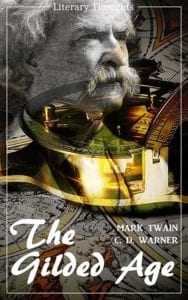
Charles Dudley Warner (1829-1900), author, critic, and editor, is best known today for his collaboration with Mark Twain on The Gilded Age (1873). Born in Plainfield, Massachusetts, on September 12, 1829, Warner worked on his guardian’s farm from ages eight to twelve, an experience that informs the memoir Being a Boy (1877). After graduating from Hamilton College in 1851, Warner, hoping to restore both his health and his fortune, joined an engineering corps surveying lands in Missouri. After returning east, he married Susan Lee (1838-1921) in 1856 and received a law degree from the University of Pennsylvania two years later. He practiced law in Chicago before moving to Hartford and beginning his journalistic career in 1860.He was a founding member of the literary colony at Nook Farm, whose members included Harriet Beecher Stowe and Mark Twain.
Warner’s principal contributions to journalism are his editorship of the influential newspaper The Hartford Courant and his exploration of the essay as a genre. In 1861, he assumed the editorship first of The Evening Press and then of The Hartford Courant, later consolidating the two papers. During the Civil War, Warner contributed essays and sketches to the Courant, consciously choosing, according to Annie Adams Fields, to focus on lighter domestic fare that would distract readers from the conflict. This series of popular editorials, later collected as My Summer in a Garden (1870), established Warner as an essayist as well as an editor, one whose genial manner and mildly humorous style recalled the work of Washington Irving. Backlog Studies (1873) continued this tradition, being “a kind of apotheosis of home” that nonetheless prefigured some of Warner’s critical preoccupations.
Beginning with Saunterings in 1872, Warner also published nine travel books, some of which focused on Europe and the Middle East. Many of his books were first published as essays in the major literary journals of the day, including The Atlantic Monthly, Harper’s, and Scribner’s. His editorship of the American Men of Letters biography series, for which he wrote the initial volume, a biography of Washington Irving, cemented his reputation as a biographer as well as an editor.
In addition to the genre of the familiar essay, Warner was successful as a critic and novelist. His essays in social and literary criticism generally favored social and literary reform, albeit of a limited kind. As a literary critic, he succeeded William Dean Howells as the writer of the influential “Editor’s Study” column for Harper’s from 1894-1898, and his judgments in the column, as in his books The Relation of Literature to Life (1896) and Fashions in Literature (1902), sought to elevate Americans’ taste in literature. After writing the satirical novel The Gilded Age with Mark Twain, Warner examined the rise and fall of a great family fortune through a trilogy of serious novels: A Little Journey in the World (1889), The Golden House (1894), and That Fortune (1899). Achieving popularity during his lifetime but not the enduring critical respect given to figures like Twain and Henry James, Warner died in Hartford on October 20, 1900.
—Dr. Donna Campbell,
Washington State University, http://public.wsu.edu/~campbelld/amlit/warner.htm
